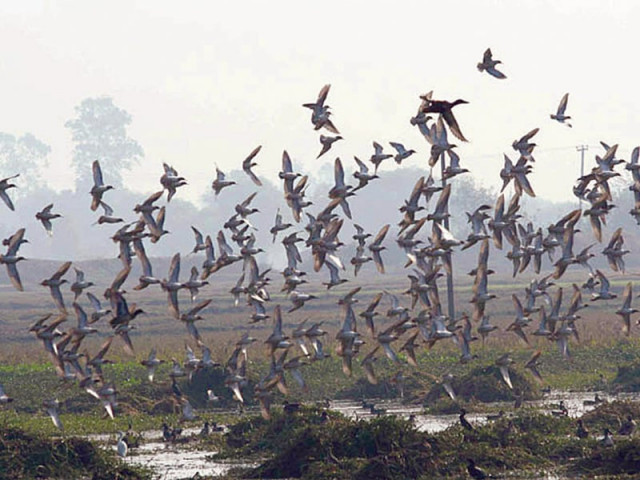Migration season: Call to protect wetlands for comfortable stay to migratory birds
Pakistan playing host to over a million guest birds from Europe, Central Asian states and India.

View of migratory birds flying in a wetland in Pakistan. PHOTO: FILE
This was stated by Dr Muhammad Rafiq, director zoological sciences division at the Pakistan Museum of Natural History (PMNH), while talking to this scribe here on Tuesday.
He was referring to the 700 thousand to 1.2 million migratory birds from Europe, Central Asian states and India that have come to Pakistan in the winter season, as they do every year, and are now spending their winters in different wetlands and deserts of the country.
The birds arrive through Indus Flyway, which is the famous flyway from Siberia and over the Karakorum, Hindu Kush, and Suleiman Ranges along the Indus River down to the delta, said Dr Rafiq. He said the birds usually start arriving through this route in November and start flying back home in March, but the periods vary depending upon weather conditions in Siberia and Pakistan.

He said the Indus Flyway is important as a large number of birds of diverse species, including water fowls, cranes, teals, pintail, mallard and gadwall, take this itinerary. Some extinguishing species like white-headed duck, Houbara Bustard and Siberian crane also travel on this route, he added.
Dr Rafiq said there are 45 sanctuaries and reserves spread over an area of about 900,000 hectares in Sindh alone. Some of the birds that come to Pakistan from northern latitudes arrive at coastal creeks. The remaining birds land up in lakes, which are fondly and proudly maintained by the landowners, he added.

Migratory birds have ecological benefits as they prey on insects and weeds, thus contributing towards the betterment of agriculture, said the director. Similarly, the faecal material of the birds consists of organic matter that contributes towards soil fertility, he said.
“As a host, it is our responsibility to provide [the brides] a comfortable and peaceful environment, which can be done by efficiently managing the wetlands. All wetlands are active agents for recharging water tables and aquifers besides being home to birds,” Dr Rafiq said.
Human activities around the birds’ dwellings, such as wars, deforestation, water pollution, hunting, introduction of exotic fish species and developing the wetlands for fisheries’ production on commercial scale are some of the common disturbance that cause irritation to birds anywhere, said the director.
Published in The Express Tribune, January 3rd, 2013.



















COMMENTS
Comments are moderated and generally will be posted if they are on-topic and not abusive.
For more information, please see our Comments FAQ